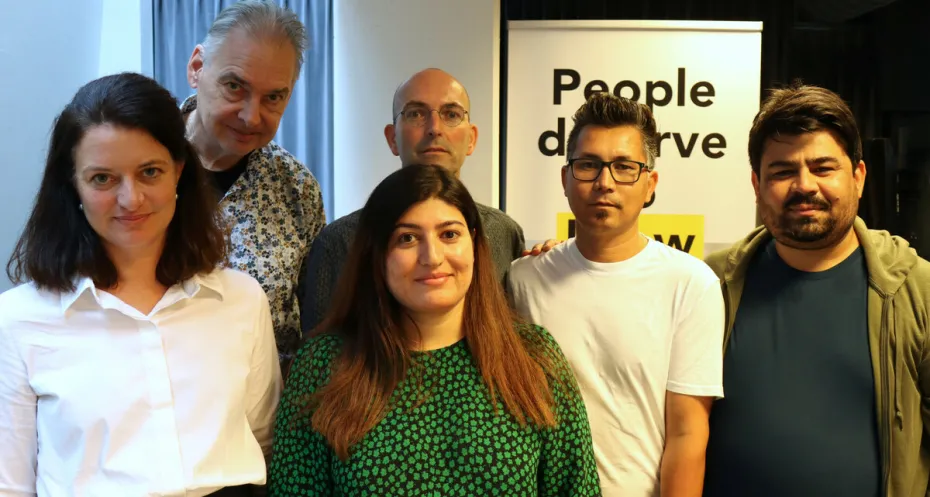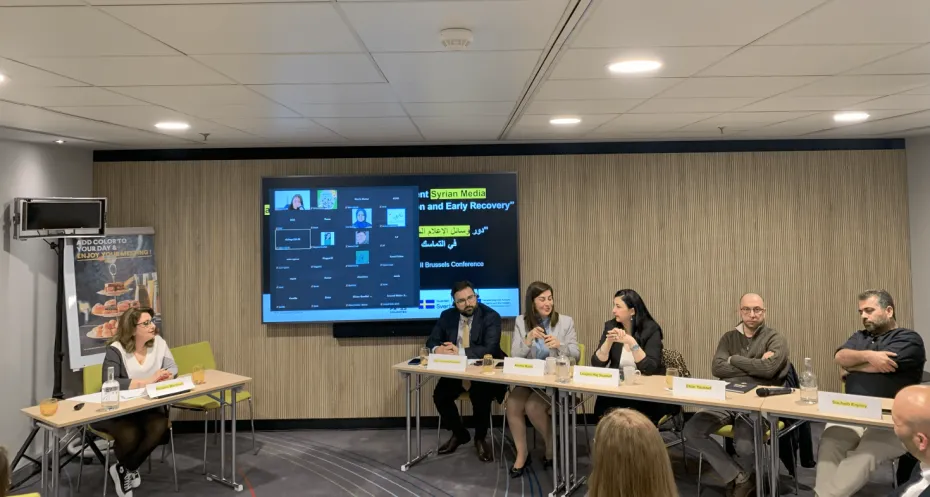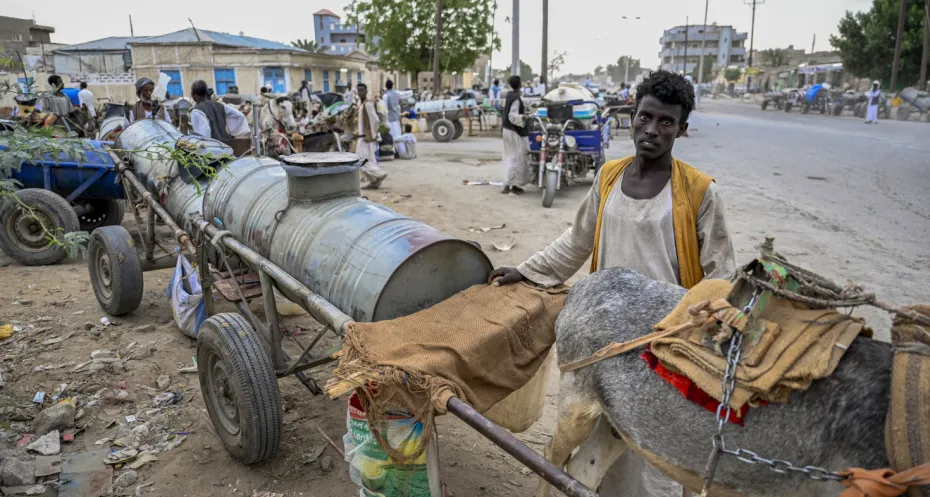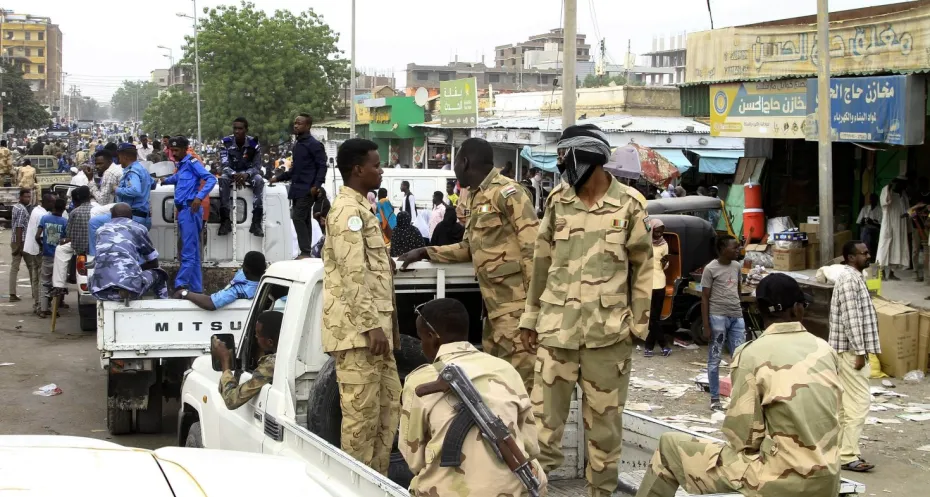"After winter comes spring" - two Afghan evacuees visit Free Press Unlimited

On Tuesday, August 30, just over a year after the crisis in Afghanistan erupted in full force, Mahbooba Siraj and Nematullah Khosh Ahmadi visited Free Press Unlimited. A special moment, after the emergency support team worked hard to evacuate them and 23 others to the Netherlands a year ago. How did they fare?
After the evacuation of Afghan media professionals to the Netherlands, Free Press Unlimited remained involved. Not only as mental support, but also by financing a counseling program by RFG Magazine. RFG Magazine is an organization that works for journalists with a refugee background. Rob Hartgers, project manager of RFG magazine, opened the meeting with an update.
"This project has many challenges," Rob explains. "We started with intake interviews, where we learned more about the person's background, and what we could help them with. Together we try to make sure they can get back to their professional lives. The people who were working in the media we try to match with a Dutch journalist."
Achievements and setbacks
Rob continues: "Our original planning was that by this time we had all the evacuees matched with a buddy. That hasn't worked out yet, because so many of the evacuees are still in AZCs, despite having been granted asylum, because of the housing shortage." Another difficulty he explains, is that many of the evacuees are traumatized by events prior to and during their flight. This, and the lack of a permanent place to live, makes it difficult to plan for the future.
Fortunately, however, they have managed to achieve some successes. For example, a photography project, New Voices, has been set up in which around 10 photographers with a refugee background, including two Afghan photographers who were part of the evacuees, have worked together. The result is an exhibition that can be seen from November 10 at the Amsterdam Public Library, and from January 2023 at other locations in the country. There have also been networking meetings with Dutch media in which several of the Afghan journalists have participated.
Rob: "We also try to get job interviews with Dutch media or other employers. This is still difficult due to the circumstances, and will take more time. That's why I don't want this project to end at the end of this year, as is currently planned, but to continue supporting these people."
Rob points out that there are many problems in the asylum system, and it is only getting worse. "We work with journalists who have been moving from refugee centre to refugee centre for years, some as long as six years. We do sometimes ask the central agency for the reception of asylum seekers if they can place journalists closer to the Randstad, where it is easier to get work in the media. But those requests are not even answered these days."
The stories of Nematullah and Mahbooba
Nematullah Khosh Ahmadi is originally from Uruzgan, from where he has worked for 20 years as a filmmaker and documentary maker for various media organizations in the country. Among other things, he worked on the documentary "Kabul, city of the wind. For another documentary, he shot most of the material while still in Afghanistan. "When I fled I took two things with me, my hard drive with the material, and clothes for my child." Now he is still looking for an editor to help him finish the documentary. RFG Magazine is also trying to help him with that. Now he has a home and is studying Cinematic Studies, and trying to finish his documentary.
All evacuees worked for Dutch organizations, but not all were journalists, there were also people among them who worked as fixers or for NGOs. So was Mahbooba Siraj, before she fled she worked for an NGO called Afghan Child Education and Care Organization (ACECO). In that role, she also met documentary filmmaker Rachel Corner, who wanted to make a documentary about Afghanistan's first orchestra made up entirely of girls and young women, many of them from an ACECO music school. Thus Mahbooba became Rachel's fixer. All the members of the orchestra also got away safely from Afghanistan and are now in Portugal. But her role as fixer for a documentary with this theme made Mahbooba vulnerable to the Taliban.
Mahbooba says, "I arrived in the Netherlands last October. We left Kabul after the initial chaos had abated somewhat. I was able to get away with my husband and son on a flight to Islamabad, Pakistan. Then we flew on to Germany, and finally we were bused to the Netherlands. After a short quarantine period in Zwolle, we ended up in the reception center in Harskamp. After one and a half months we received our residence status and ended up in the south of the Netherlands. There we spent another 2-3 months before getting a house in Krommenie, where we live now."
Traumatising time
Settling down in the Netherlands is not easy. "The time before we fled Afghanistan has been traumatising. There was a moment when I went to the airport in Kabul with my husband, intending to leave, but I couldn't and went back home. But for the people who went along in the military planes, it must have been even more traumatizing. My flight was good in the end because we were able to go on a commercial flight."
"When we came here there was so much uncertainty, we didn't know what kind of future we could have here. You don't know the answers to most questions." Mahbooba breaks for a moment, as the emotions are still very much on the surface. "We had no one here," she continues. "I also had my 3-year-old son with me, and it was very difficult to have him move from place to place. And my family was still in Afghanistan, and that made me feel very desperate. We knew we were safe, but mentally we didn't feel that way. But now we live in Krommenie and my son goes to a daycare center. Yes, things are better now."
Hope
When asked what gives her hope, she immediately answers, "My son." She continues, "I tried incredibly hard, just for him. I also know: after winter always comes spring. I know it will get better. Even when I think about home, it will get better there too. I have hope and believe in positivity."


